University Case Study: Elon Musk and Transformational Leadership
VerifiedAdded on 2023/04/11
|13
|2632
|208
Case Study
AI Summary
This case study examines the leadership of Elon Musk, focusing on his transformational leadership style, ethical considerations, and the qualities that contribute to his success. It explores the various leadership theories that align with Musk's approach, analyzing his vision for companies like Tesla and SpaceX. The analysis covers leadership qualities such as passion, decisiveness, and ethical practices, and how they have influenced business outcomes. The study also highlights the advantages and disadvantages of his ethical leadership, emphasizing his commitment to innovation, corporate social responsibility, and the well-being of his employees. The case study provides a comprehensive overview of Musk's leadership strategies, linking them to both successes and potential areas for improvement, all supported by relevant leadership theories and academic research.
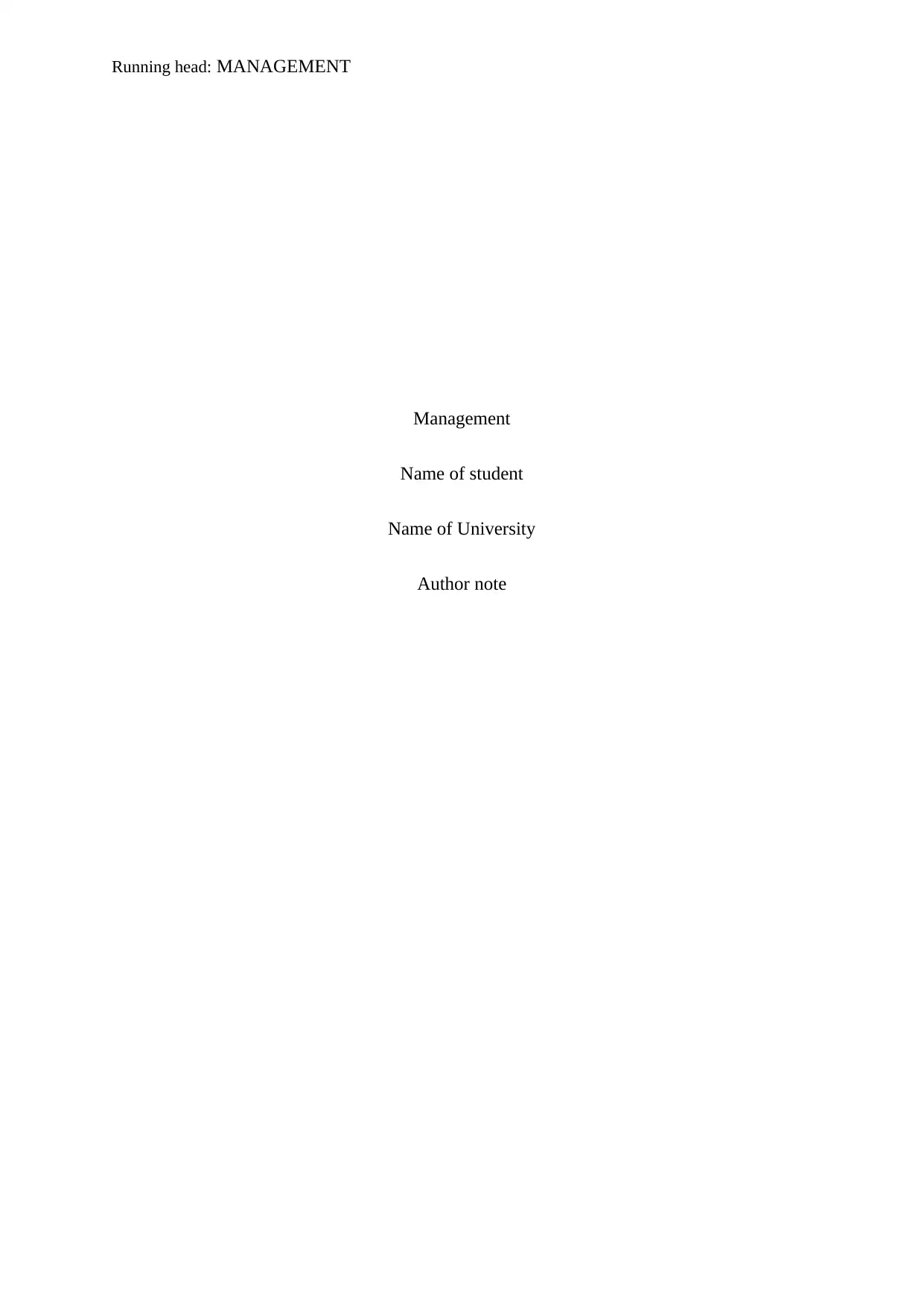
Running head: MANAGEMENT
Management
Name of student
Name of University
Author note
Management
Name of student
Name of University
Author note
Paraphrase This Document
Need a fresh take? Get an instant paraphrase of this document with our AI Paraphraser
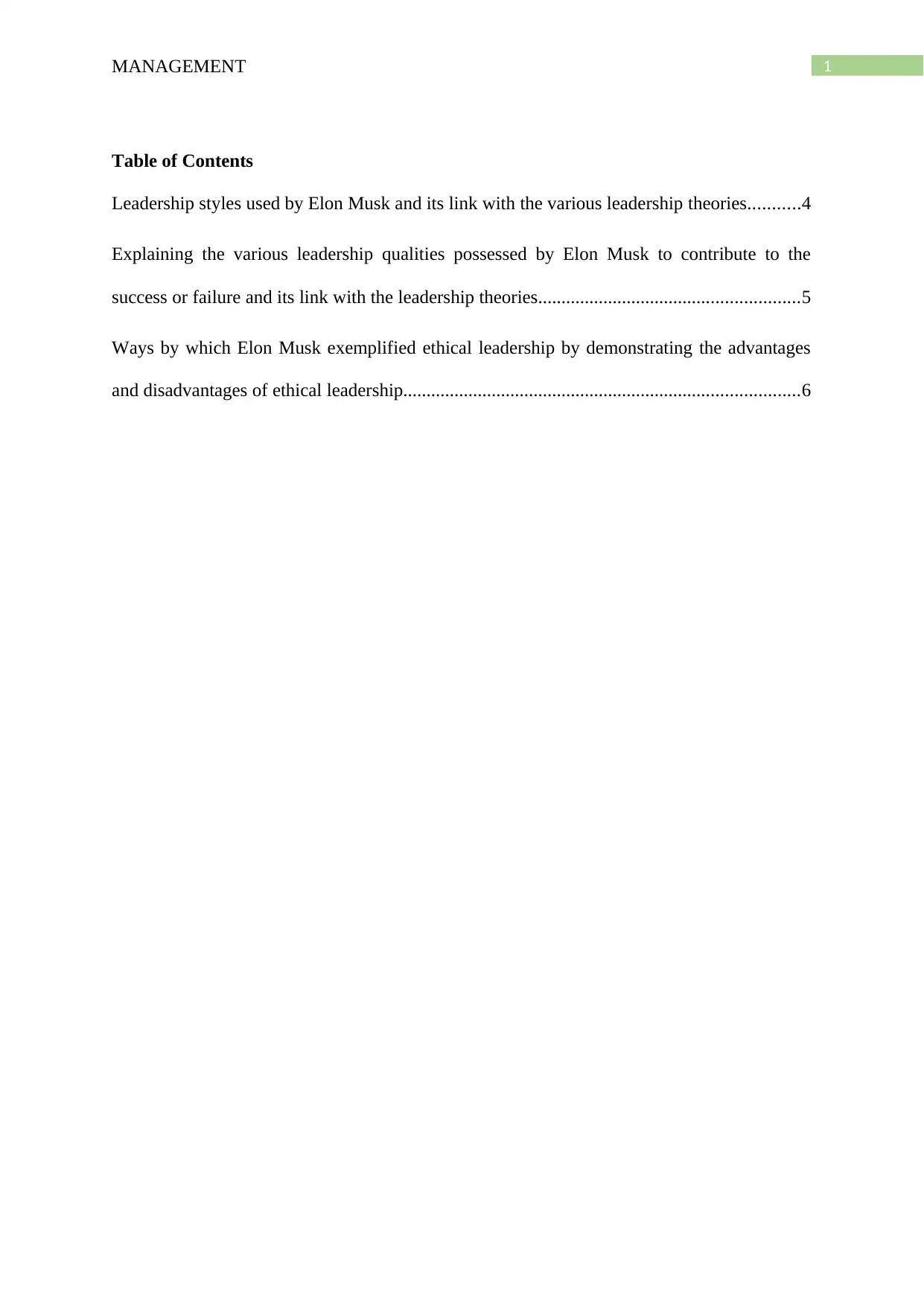
1MANAGEMENT
Table of Contents
Leadership styles used by Elon Musk and its link with the various leadership theories...........4
Explaining the various leadership qualities possessed by Elon Musk to contribute to the
success or failure and its link with the leadership theories........................................................5
Ways by which Elon Musk exemplified ethical leadership by demonstrating the advantages
and disadvantages of ethical leadership.....................................................................................6
Table of Contents
Leadership styles used by Elon Musk and its link with the various leadership theories...........4
Explaining the various leadership qualities possessed by Elon Musk to contribute to the
success or failure and its link with the leadership theories........................................................5
Ways by which Elon Musk exemplified ethical leadership by demonstrating the advantages
and disadvantages of ethical leadership.....................................................................................6
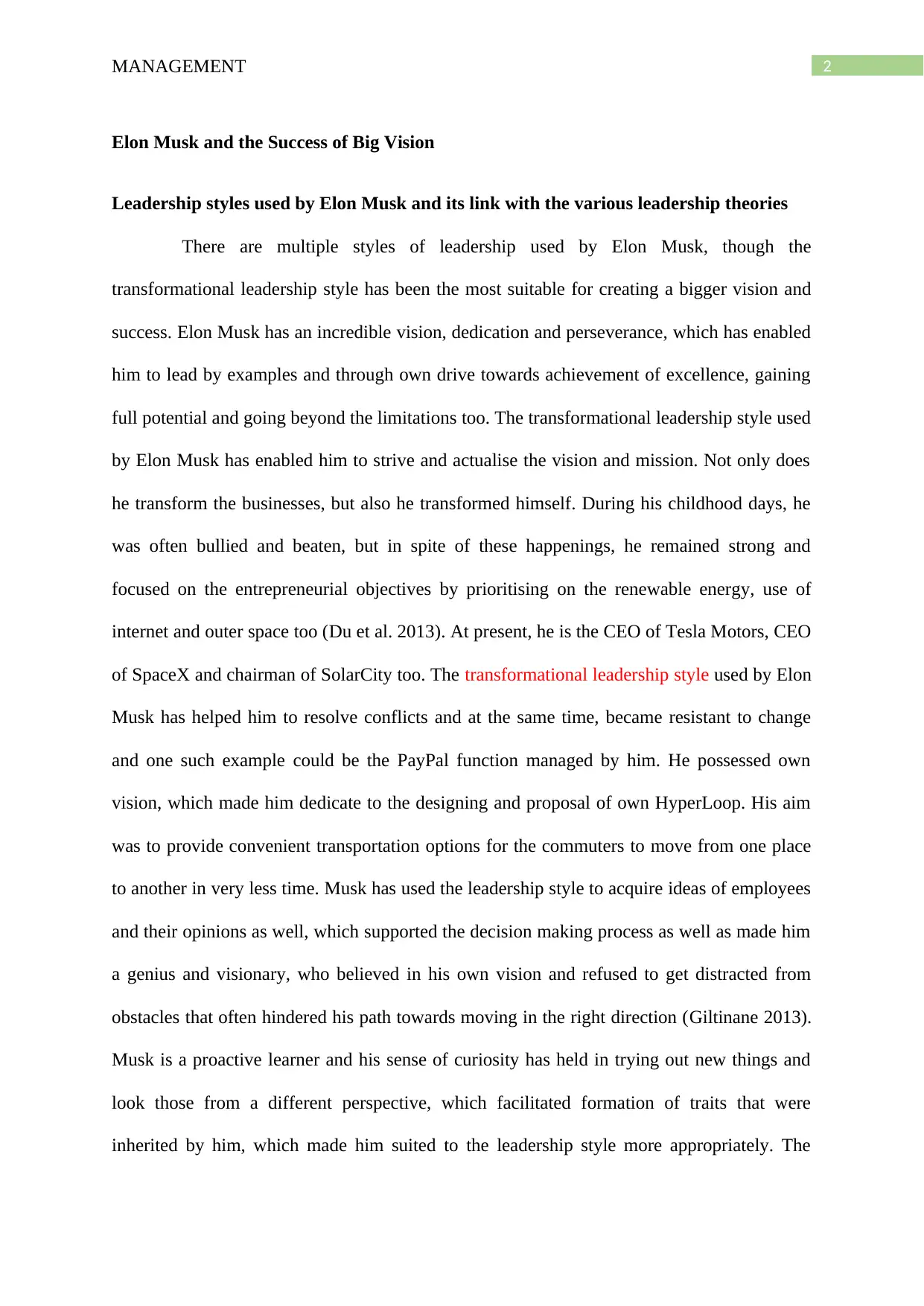
2MANAGEMENT
Elon Musk and the Success of Big Vision
Leadership styles used by Elon Musk and its link with the various leadership theories
There are multiple styles of leadership used by Elon Musk, though the
transformational leadership style has been the most suitable for creating a bigger vision and
success. Elon Musk has an incredible vision, dedication and perseverance, which has enabled
him to lead by examples and through own drive towards achievement of excellence, gaining
full potential and going beyond the limitations too. The transformational leadership style used
by Elon Musk has enabled him to strive and actualise the vision and mission. Not only does
he transform the businesses, but also he transformed himself. During his childhood days, he
was often bullied and beaten, but in spite of these happenings, he remained strong and
focused on the entrepreneurial objectives by prioritising on the renewable energy, use of
internet and outer space too (Du et al. 2013). At present, he is the CEO of Tesla Motors, CEO
of SpaceX and chairman of SolarCity too. The transformational leadership style used by Elon
Musk has helped him to resolve conflicts and at the same time, became resistant to change
and one such example could be the PayPal function managed by him. He possessed own
vision, which made him dedicate to the designing and proposal of own HyperLoop. His aim
was to provide convenient transportation options for the commuters to move from one place
to another in very less time. Musk has used the leadership style to acquire ideas of employees
and their opinions as well, which supported the decision making process as well as made him
a genius and visionary, who believed in his own vision and refused to get distracted from
obstacles that often hindered his path towards moving in the right direction (Giltinane 2013).
Musk is a proactive learner and his sense of curiosity has held in trying out new things and
look those from a different perspective, which facilitated formation of traits that were
inherited by him, which made him suited to the leadership style more appropriately. The
Elon Musk and the Success of Big Vision
Leadership styles used by Elon Musk and its link with the various leadership theories
There are multiple styles of leadership used by Elon Musk, though the
transformational leadership style has been the most suitable for creating a bigger vision and
success. Elon Musk has an incredible vision, dedication and perseverance, which has enabled
him to lead by examples and through own drive towards achievement of excellence, gaining
full potential and going beyond the limitations too. The transformational leadership style used
by Elon Musk has enabled him to strive and actualise the vision and mission. Not only does
he transform the businesses, but also he transformed himself. During his childhood days, he
was often bullied and beaten, but in spite of these happenings, he remained strong and
focused on the entrepreneurial objectives by prioritising on the renewable energy, use of
internet and outer space too (Du et al. 2013). At present, he is the CEO of Tesla Motors, CEO
of SpaceX and chairman of SolarCity too. The transformational leadership style used by Elon
Musk has helped him to resolve conflicts and at the same time, became resistant to change
and one such example could be the PayPal function managed by him. He possessed own
vision, which made him dedicate to the designing and proposal of own HyperLoop. His aim
was to provide convenient transportation options for the commuters to move from one place
to another in very less time. Musk has used the leadership style to acquire ideas of employees
and their opinions as well, which supported the decision making process as well as made him
a genius and visionary, who believed in his own vision and refused to get distracted from
obstacles that often hindered his path towards moving in the right direction (Giltinane 2013).
Musk is a proactive learner and his sense of curiosity has held in trying out new things and
look those from a different perspective, which facilitated formation of traits that were
inherited by him, which made him suited to the leadership style more appropriately. The
⊘ This is a preview!⊘
Do you want full access?
Subscribe today to unlock all pages.

Trusted by 1+ million students worldwide
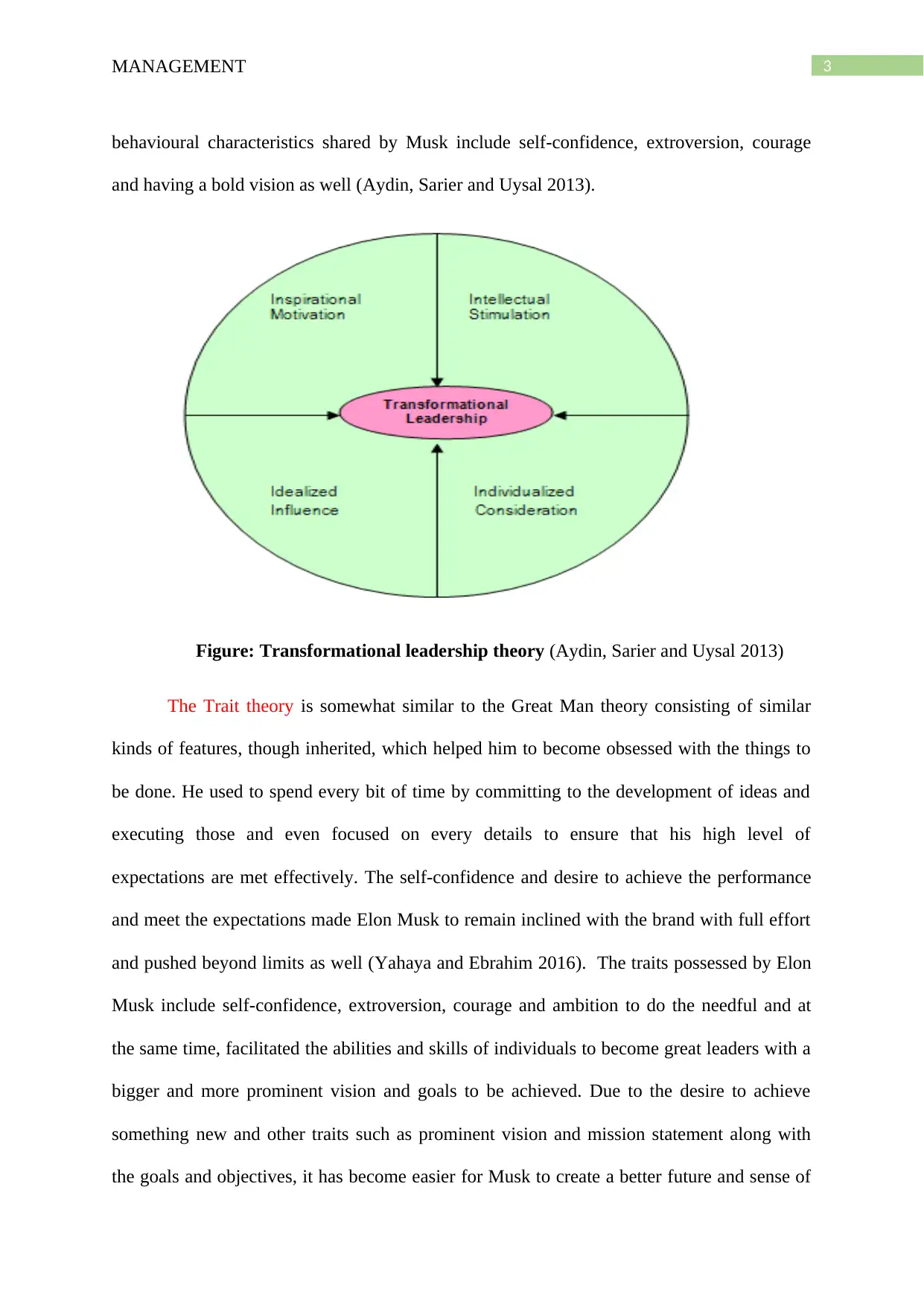
3MANAGEMENT
behavioural characteristics shared by Musk include self-confidence, extroversion, courage
and having a bold vision as well (Aydin, Sarier and Uysal 2013).
Figure: Transformational leadership theory (Aydin, Sarier and Uysal 2013)
The Trait theory is somewhat similar to the Great Man theory consisting of similar
kinds of features, though inherited, which helped him to become obsessed with the things to
be done. He used to spend every bit of time by committing to the development of ideas and
executing those and even focused on every details to ensure that his high level of
expectations are met effectively. The self-confidence and desire to achieve the performance
and meet the expectations made Elon Musk to remain inclined with the brand with full effort
and pushed beyond limits as well (Yahaya and Ebrahim 2016). The traits possessed by Elon
Musk include self-confidence, extroversion, courage and ambition to do the needful and at
the same time, facilitated the abilities and skills of individuals to become great leaders with a
bigger and more prominent vision and goals to be achieved. Due to the desire to achieve
something new and other traits such as prominent vision and mission statement along with
the goals and objectives, it has become easier for Musk to create a better future and sense of
behavioural characteristics shared by Musk include self-confidence, extroversion, courage
and having a bold vision as well (Aydin, Sarier and Uysal 2013).
Figure: Transformational leadership theory (Aydin, Sarier and Uysal 2013)
The Trait theory is somewhat similar to the Great Man theory consisting of similar
kinds of features, though inherited, which helped him to become obsessed with the things to
be done. He used to spend every bit of time by committing to the development of ideas and
executing those and even focused on every details to ensure that his high level of
expectations are met effectively. The self-confidence and desire to achieve the performance
and meet the expectations made Elon Musk to remain inclined with the brand with full effort
and pushed beyond limits as well (Yahaya and Ebrahim 2016). The traits possessed by Elon
Musk include self-confidence, extroversion, courage and ambition to do the needful and at
the same time, facilitated the abilities and skills of individuals to become great leaders with a
bigger and more prominent vision and goals to be achieved. Due to the desire to achieve
something new and other traits such as prominent vision and mission statement along with
the goals and objectives, it has become easier for Musk to create a better future and sense of
Paraphrase This Document
Need a fresh take? Get an instant paraphrase of this document with our AI Paraphraser
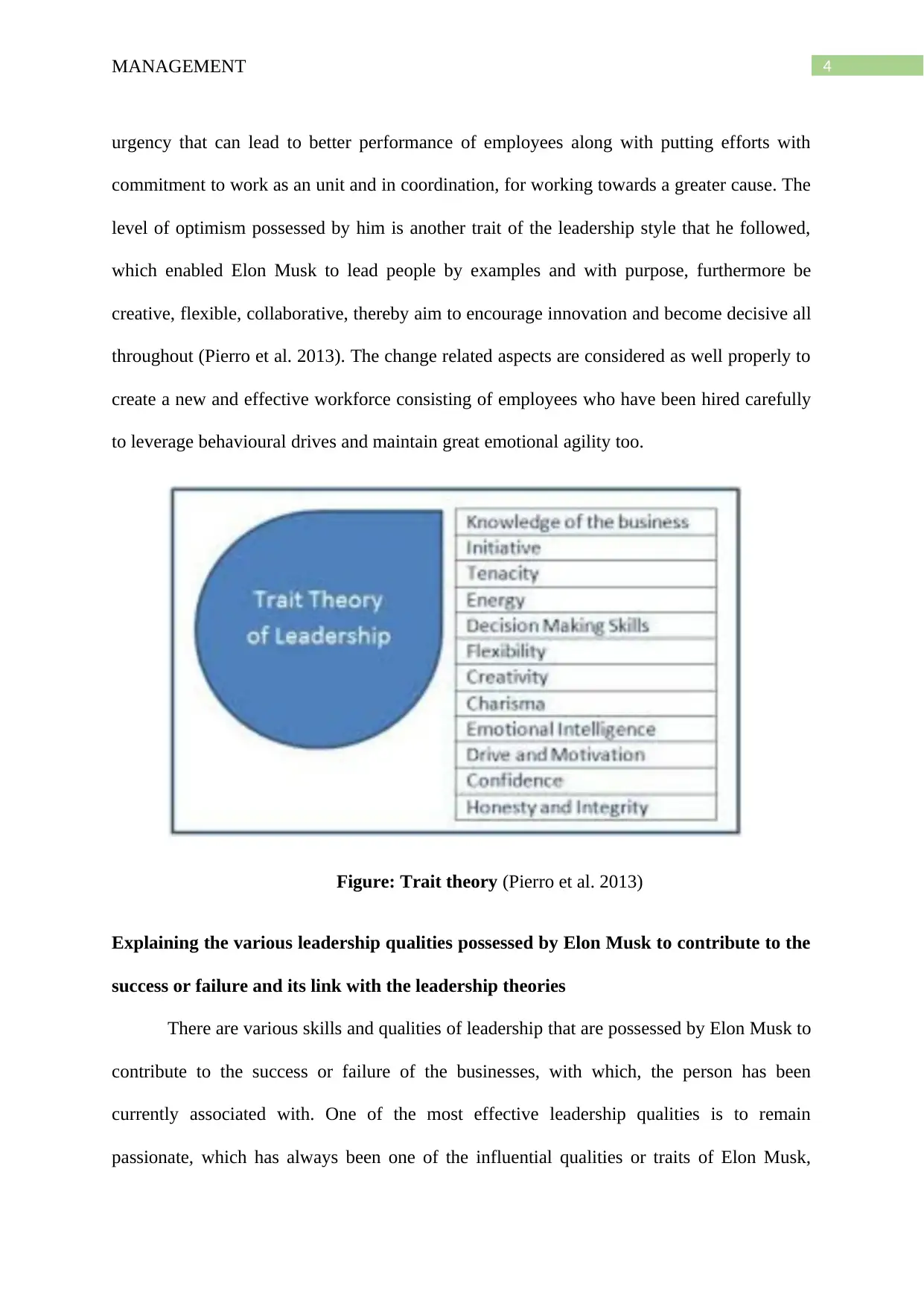
4MANAGEMENT
urgency that can lead to better performance of employees along with putting efforts with
commitment to work as an unit and in coordination, for working towards a greater cause. The
level of optimism possessed by him is another trait of the leadership style that he followed,
which enabled Elon Musk to lead people by examples and with purpose, furthermore be
creative, flexible, collaborative, thereby aim to encourage innovation and become decisive all
throughout (Pierro et al. 2013). The change related aspects are considered as well properly to
create a new and effective workforce consisting of employees who have been hired carefully
to leverage behavioural drives and maintain great emotional agility too.
Figure: Trait theory (Pierro et al. 2013)
Explaining the various leadership qualities possessed by Elon Musk to contribute to the
success or failure and its link with the leadership theories
There are various skills and qualities of leadership that are possessed by Elon Musk to
contribute to the success or failure of the businesses, with which, the person has been
currently associated with. One of the most effective leadership qualities is to remain
passionate, which has always been one of the influential qualities or traits of Elon Musk,
urgency that can lead to better performance of employees along with putting efforts with
commitment to work as an unit and in coordination, for working towards a greater cause. The
level of optimism possessed by him is another trait of the leadership style that he followed,
which enabled Elon Musk to lead people by examples and with purpose, furthermore be
creative, flexible, collaborative, thereby aim to encourage innovation and become decisive all
throughout (Pierro et al. 2013). The change related aspects are considered as well properly to
create a new and effective workforce consisting of employees who have been hired carefully
to leverage behavioural drives and maintain great emotional agility too.
Figure: Trait theory (Pierro et al. 2013)
Explaining the various leadership qualities possessed by Elon Musk to contribute to the
success or failure and its link with the leadership theories
There are various skills and qualities of leadership that are possessed by Elon Musk to
contribute to the success or failure of the businesses, with which, the person has been
currently associated with. One of the most effective leadership qualities is to remain
passionate, which has always been one of the influential qualities or traits of Elon Musk,
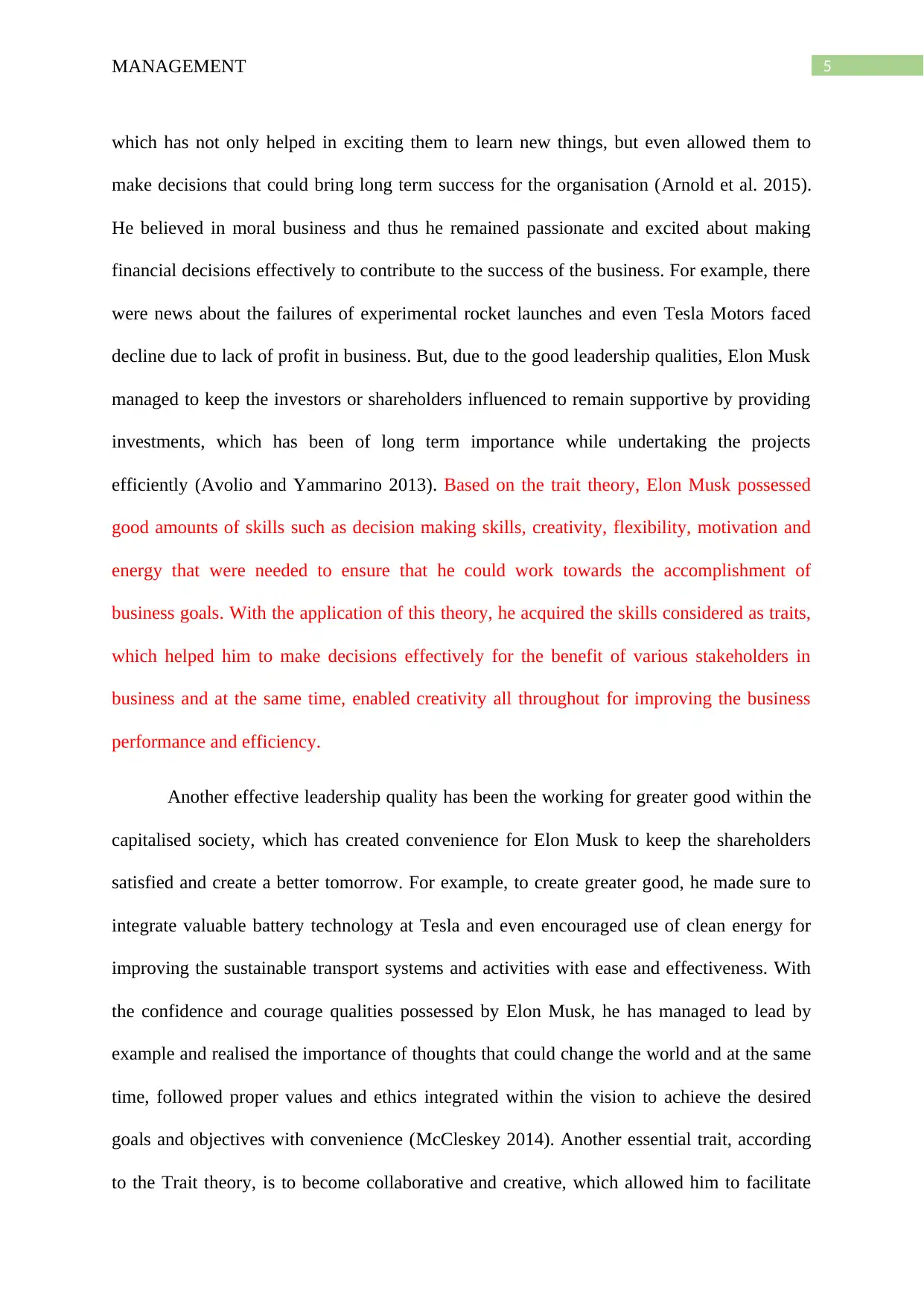
5MANAGEMENT
which has not only helped in exciting them to learn new things, but even allowed them to
make decisions that could bring long term success for the organisation (Arnold et al. 2015).
He believed in moral business and thus he remained passionate and excited about making
financial decisions effectively to contribute to the success of the business. For example, there
were news about the failures of experimental rocket launches and even Tesla Motors faced
decline due to lack of profit in business. But, due to the good leadership qualities, Elon Musk
managed to keep the investors or shareholders influenced to remain supportive by providing
investments, which has been of long term importance while undertaking the projects
efficiently (Avolio and Yammarino 2013). Based on the trait theory, Elon Musk possessed
good amounts of skills such as decision making skills, creativity, flexibility, motivation and
energy that were needed to ensure that he could work towards the accomplishment of
business goals. With the application of this theory, he acquired the skills considered as traits,
which helped him to make decisions effectively for the benefit of various stakeholders in
business and at the same time, enabled creativity all throughout for improving the business
performance and efficiency.
Another effective leadership quality has been the working for greater good within the
capitalised society, which has created convenience for Elon Musk to keep the shareholders
satisfied and create a better tomorrow. For example, to create greater good, he made sure to
integrate valuable battery technology at Tesla and even encouraged use of clean energy for
improving the sustainable transport systems and activities with ease and effectiveness. With
the confidence and courage qualities possessed by Elon Musk, he has managed to lead by
example and realised the importance of thoughts that could change the world and at the same
time, followed proper values and ethics integrated within the vision to achieve the desired
goals and objectives with convenience (McCleskey 2014). Another essential trait, according
to the Trait theory, is to become collaborative and creative, which allowed him to facilitate
which has not only helped in exciting them to learn new things, but even allowed them to
make decisions that could bring long term success for the organisation (Arnold et al. 2015).
He believed in moral business and thus he remained passionate and excited about making
financial decisions effectively to contribute to the success of the business. For example, there
were news about the failures of experimental rocket launches and even Tesla Motors faced
decline due to lack of profit in business. But, due to the good leadership qualities, Elon Musk
managed to keep the investors or shareholders influenced to remain supportive by providing
investments, which has been of long term importance while undertaking the projects
efficiently (Avolio and Yammarino 2013). Based on the trait theory, Elon Musk possessed
good amounts of skills such as decision making skills, creativity, flexibility, motivation and
energy that were needed to ensure that he could work towards the accomplishment of
business goals. With the application of this theory, he acquired the skills considered as traits,
which helped him to make decisions effectively for the benefit of various stakeholders in
business and at the same time, enabled creativity all throughout for improving the business
performance and efficiency.
Another effective leadership quality has been the working for greater good within the
capitalised society, which has created convenience for Elon Musk to keep the shareholders
satisfied and create a better tomorrow. For example, to create greater good, he made sure to
integrate valuable battery technology at Tesla and even encouraged use of clean energy for
improving the sustainable transport systems and activities with ease and effectiveness. With
the confidence and courage qualities possessed by Elon Musk, he has managed to lead by
example and realised the importance of thoughts that could change the world and at the same
time, followed proper values and ethics integrated within the vision to achieve the desired
goals and objectives with convenience (McCleskey 2014). Another essential trait, according
to the Trait theory, is to become collaborative and creative, which allowed him to facilitate
⊘ This is a preview!⊘
Do you want full access?
Subscribe today to unlock all pages.

Trusted by 1+ million students worldwide
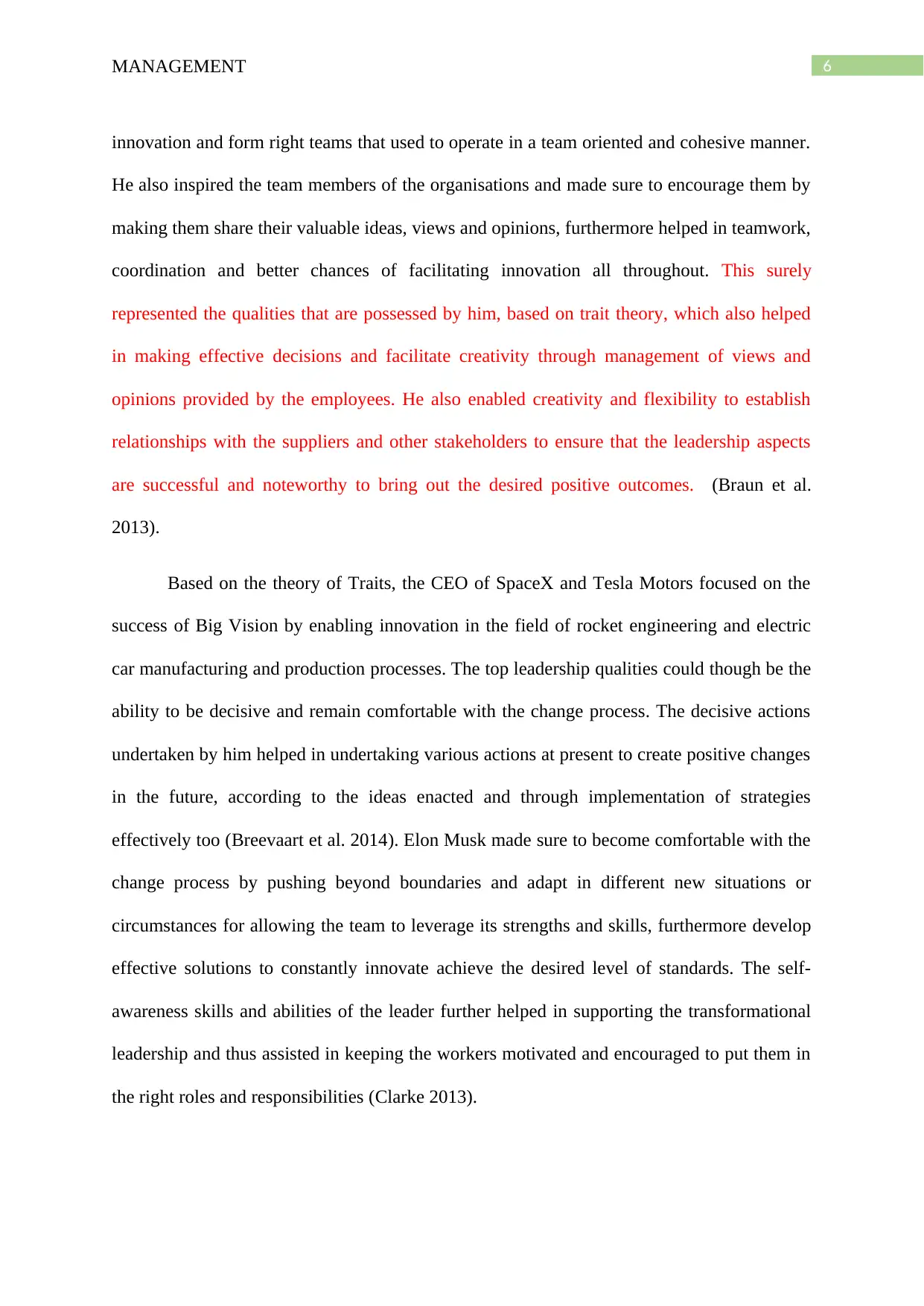
6MANAGEMENT
innovation and form right teams that used to operate in a team oriented and cohesive manner.
He also inspired the team members of the organisations and made sure to encourage them by
making them share their valuable ideas, views and opinions, furthermore helped in teamwork,
coordination and better chances of facilitating innovation all throughout. This surely
represented the qualities that are possessed by him, based on trait theory, which also helped
in making effective decisions and facilitate creativity through management of views and
opinions provided by the employees. He also enabled creativity and flexibility to establish
relationships with the suppliers and other stakeholders to ensure that the leadership aspects
are successful and noteworthy to bring out the desired positive outcomes. (Braun et al.
2013).
Based on the theory of Traits, the CEO of SpaceX and Tesla Motors focused on the
success of Big Vision by enabling innovation in the field of rocket engineering and electric
car manufacturing and production processes. The top leadership qualities could though be the
ability to be decisive and remain comfortable with the change process. The decisive actions
undertaken by him helped in undertaking various actions at present to create positive changes
in the future, according to the ideas enacted and through implementation of strategies
effectively too (Breevaart et al. 2014). Elon Musk made sure to become comfortable with the
change process by pushing beyond boundaries and adapt in different new situations or
circumstances for allowing the team to leverage its strengths and skills, furthermore develop
effective solutions to constantly innovate achieve the desired level of standards. The self-
awareness skills and abilities of the leader further helped in supporting the transformational
leadership and thus assisted in keeping the workers motivated and encouraged to put them in
the right roles and responsibilities (Clarke 2013).
innovation and form right teams that used to operate in a team oriented and cohesive manner.
He also inspired the team members of the organisations and made sure to encourage them by
making them share their valuable ideas, views and opinions, furthermore helped in teamwork,
coordination and better chances of facilitating innovation all throughout. This surely
represented the qualities that are possessed by him, based on trait theory, which also helped
in making effective decisions and facilitate creativity through management of views and
opinions provided by the employees. He also enabled creativity and flexibility to establish
relationships with the suppliers and other stakeholders to ensure that the leadership aspects
are successful and noteworthy to bring out the desired positive outcomes. (Braun et al.
2013).
Based on the theory of Traits, the CEO of SpaceX and Tesla Motors focused on the
success of Big Vision by enabling innovation in the field of rocket engineering and electric
car manufacturing and production processes. The top leadership qualities could though be the
ability to be decisive and remain comfortable with the change process. The decisive actions
undertaken by him helped in undertaking various actions at present to create positive changes
in the future, according to the ideas enacted and through implementation of strategies
effectively too (Breevaart et al. 2014). Elon Musk made sure to become comfortable with the
change process by pushing beyond boundaries and adapt in different new situations or
circumstances for allowing the team to leverage its strengths and skills, furthermore develop
effective solutions to constantly innovate achieve the desired level of standards. The self-
awareness skills and abilities of the leader further helped in supporting the transformational
leadership and thus assisted in keeping the workers motivated and encouraged to put them in
the right roles and responsibilities (Clarke 2013).
Paraphrase This Document
Need a fresh take? Get an instant paraphrase of this document with our AI Paraphraser
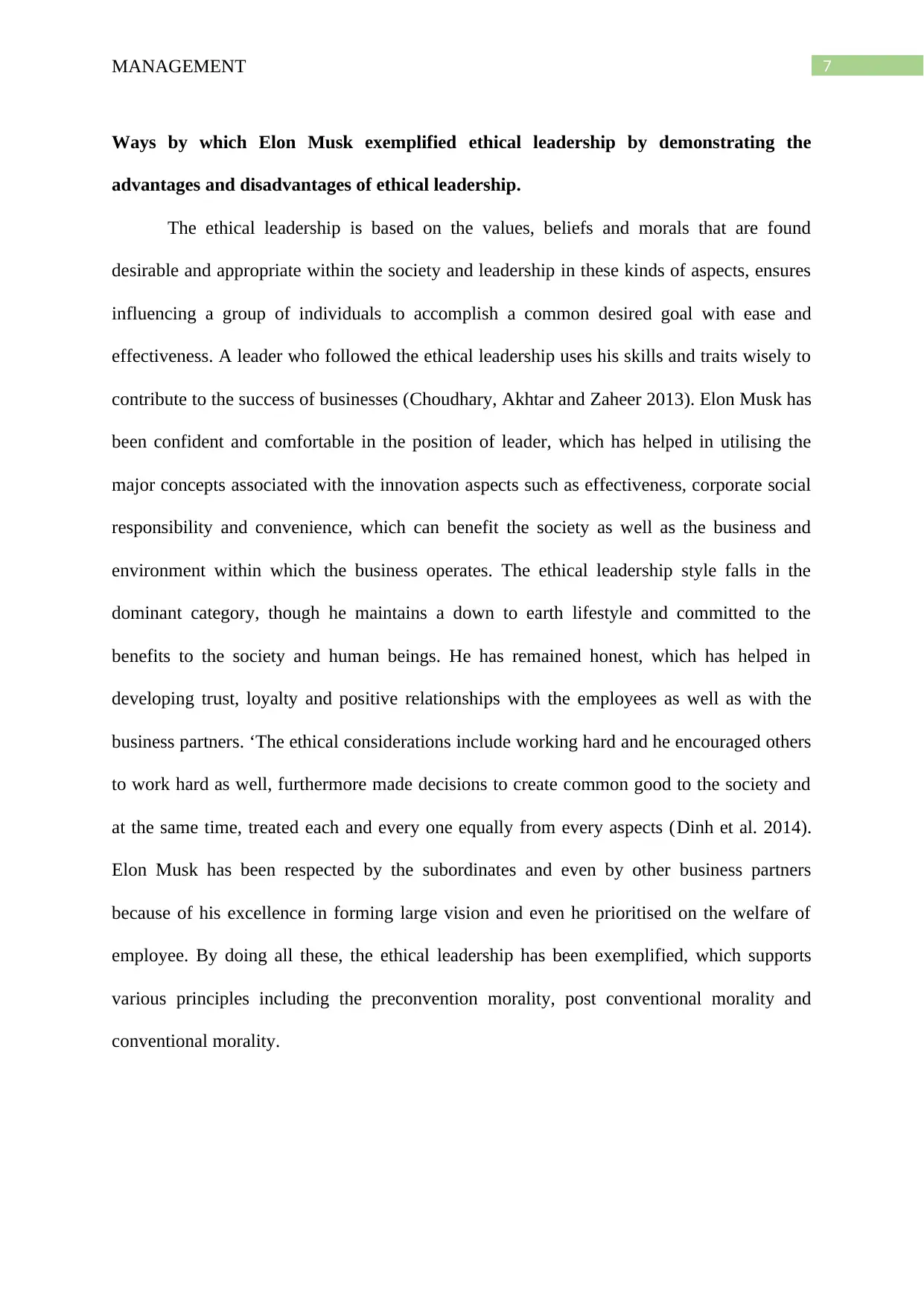
7MANAGEMENT
Ways by which Elon Musk exemplified ethical leadership by demonstrating the
advantages and disadvantages of ethical leadership.
The ethical leadership is based on the values, beliefs and morals that are found
desirable and appropriate within the society and leadership in these kinds of aspects, ensures
influencing a group of individuals to accomplish a common desired goal with ease and
effectiveness. A leader who followed the ethical leadership uses his skills and traits wisely to
contribute to the success of businesses (Choudhary, Akhtar and Zaheer 2013). Elon Musk has
been confident and comfortable in the position of leader, which has helped in utilising the
major concepts associated with the innovation aspects such as effectiveness, corporate social
responsibility and convenience, which can benefit the society as well as the business and
environment within which the business operates. The ethical leadership style falls in the
dominant category, though he maintains a down to earth lifestyle and committed to the
benefits to the society and human beings. He has remained honest, which has helped in
developing trust, loyalty and positive relationships with the employees as well as with the
business partners. ‘The ethical considerations include working hard and he encouraged others
to work hard as well, furthermore made decisions to create common good to the society and
at the same time, treated each and every one equally from every aspects (Dinh et al. 2014).
Elon Musk has been respected by the subordinates and even by other business partners
because of his excellence in forming large vision and even he prioritised on the welfare of
employee. By doing all these, the ethical leadership has been exemplified, which supports
various principles including the preconvention morality, post conventional morality and
conventional morality.
Ways by which Elon Musk exemplified ethical leadership by demonstrating the
advantages and disadvantages of ethical leadership.
The ethical leadership is based on the values, beliefs and morals that are found
desirable and appropriate within the society and leadership in these kinds of aspects, ensures
influencing a group of individuals to accomplish a common desired goal with ease and
effectiveness. A leader who followed the ethical leadership uses his skills and traits wisely to
contribute to the success of businesses (Choudhary, Akhtar and Zaheer 2013). Elon Musk has
been confident and comfortable in the position of leader, which has helped in utilising the
major concepts associated with the innovation aspects such as effectiveness, corporate social
responsibility and convenience, which can benefit the society as well as the business and
environment within which the business operates. The ethical leadership style falls in the
dominant category, though he maintains a down to earth lifestyle and committed to the
benefits to the society and human beings. He has remained honest, which has helped in
developing trust, loyalty and positive relationships with the employees as well as with the
business partners. ‘The ethical considerations include working hard and he encouraged others
to work hard as well, furthermore made decisions to create common good to the society and
at the same time, treated each and every one equally from every aspects (Dinh et al. 2014).
Elon Musk has been respected by the subordinates and even by other business partners
because of his excellence in forming large vision and even he prioritised on the welfare of
employee. By doing all these, the ethical leadership has been exemplified, which supports
various principles including the preconvention morality, post conventional morality and
conventional morality.
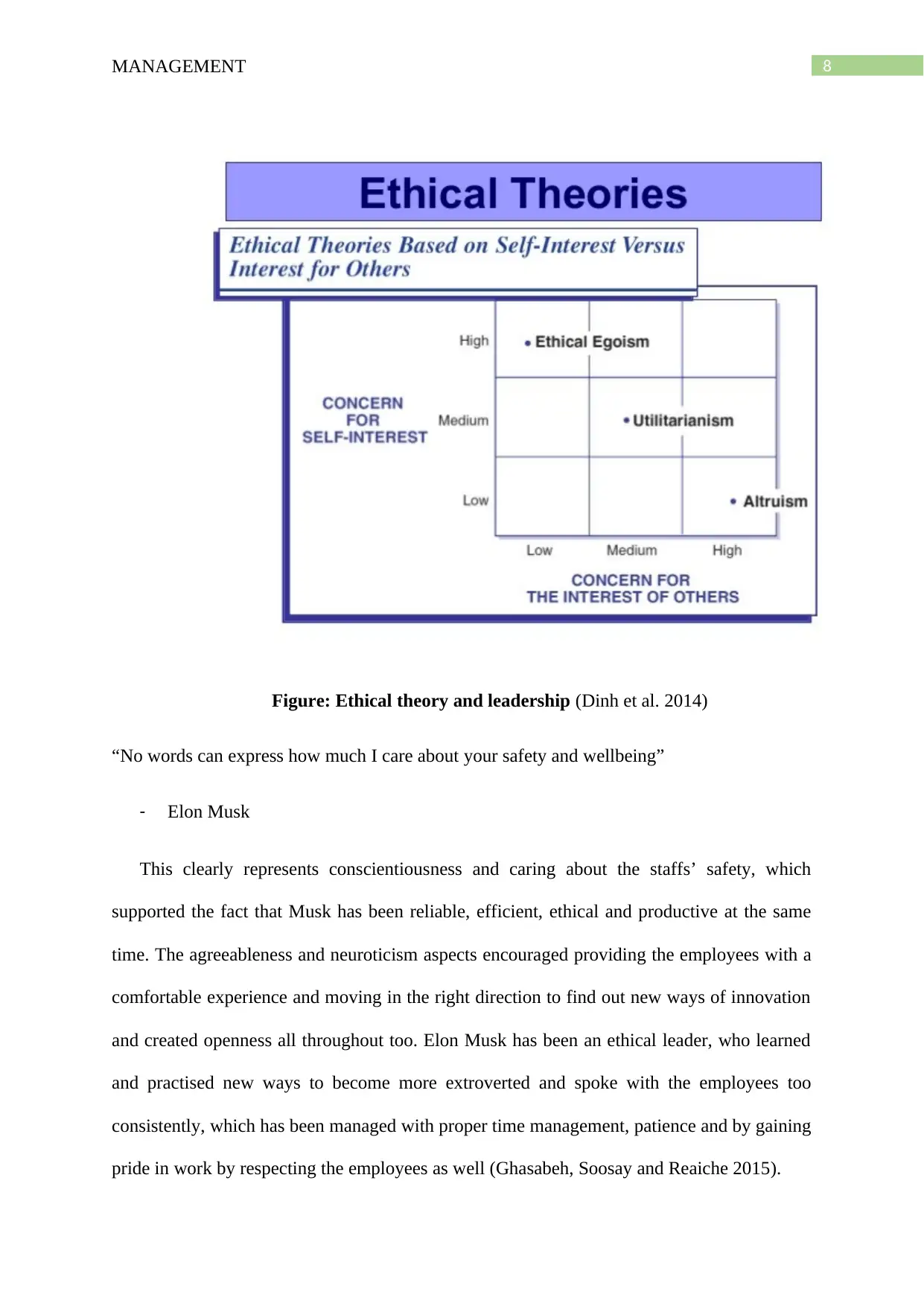
8MANAGEMENT
Figure: Ethical theory and leadership (Dinh et al. 2014)
“No words can express how much I care about your safety and wellbeing”
- Elon Musk
This clearly represents conscientiousness and caring about the staffs’ safety, which
supported the fact that Musk has been reliable, efficient, ethical and productive at the same
time. The agreeableness and neuroticism aspects encouraged providing the employees with a
comfortable experience and moving in the right direction to find out new ways of innovation
and created openness all throughout too. Elon Musk has been an ethical leader, who learned
and practised new ways to become more extroverted and spoke with the employees too
consistently, which has been managed with proper time management, patience and by gaining
pride in work by respecting the employees as well (Ghasabeh, Soosay and Reaiche 2015).
Figure: Ethical theory and leadership (Dinh et al. 2014)
“No words can express how much I care about your safety and wellbeing”
- Elon Musk
This clearly represents conscientiousness and caring about the staffs’ safety, which
supported the fact that Musk has been reliable, efficient, ethical and productive at the same
time. The agreeableness and neuroticism aspects encouraged providing the employees with a
comfortable experience and moving in the right direction to find out new ways of innovation
and created openness all throughout too. Elon Musk has been an ethical leader, who learned
and practised new ways to become more extroverted and spoke with the employees too
consistently, which has been managed with proper time management, patience and by gaining
pride in work by respecting the employees as well (Ghasabeh, Soosay and Reaiche 2015).
⊘ This is a preview!⊘
Do you want full access?
Subscribe today to unlock all pages.

Trusted by 1+ million students worldwide
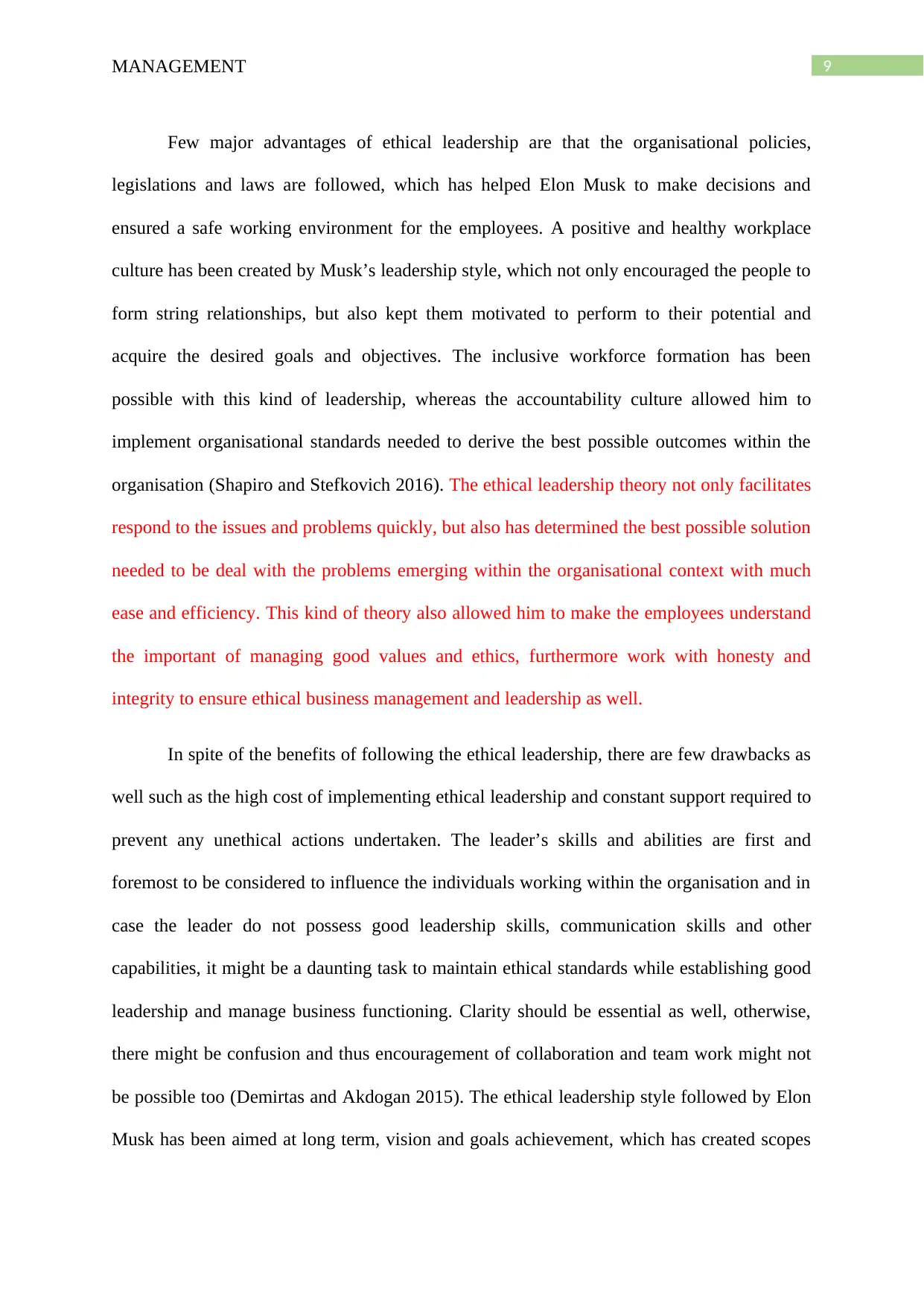
9MANAGEMENT
Few major advantages of ethical leadership are that the organisational policies,
legislations and laws are followed, which has helped Elon Musk to make decisions and
ensured a safe working environment for the employees. A positive and healthy workplace
culture has been created by Musk’s leadership style, which not only encouraged the people to
form string relationships, but also kept them motivated to perform to their potential and
acquire the desired goals and objectives. The inclusive workforce formation has been
possible with this kind of leadership, whereas the accountability culture allowed him to
implement organisational standards needed to derive the best possible outcomes within the
organisation (Shapiro and Stefkovich 2016). The ethical leadership theory not only facilitates
respond to the issues and problems quickly, but also has determined the best possible solution
needed to be deal with the problems emerging within the organisational context with much
ease and efficiency. This kind of theory also allowed him to make the employees understand
the important of managing good values and ethics, furthermore work with honesty and
integrity to ensure ethical business management and leadership as well.
In spite of the benefits of following the ethical leadership, there are few drawbacks as
well such as the high cost of implementing ethical leadership and constant support required to
prevent any unethical actions undertaken. The leader’s skills and abilities are first and
foremost to be considered to influence the individuals working within the organisation and in
case the leader do not possess good leadership skills, communication skills and other
capabilities, it might be a daunting task to maintain ethical standards while establishing good
leadership and manage business functioning. Clarity should be essential as well, otherwise,
there might be confusion and thus encouragement of collaboration and team work might not
be possible too (Demirtas and Akdogan 2015). The ethical leadership style followed by Elon
Musk has been aimed at long term, vision and goals achievement, which has created scopes
Few major advantages of ethical leadership are that the organisational policies,
legislations and laws are followed, which has helped Elon Musk to make decisions and
ensured a safe working environment for the employees. A positive and healthy workplace
culture has been created by Musk’s leadership style, which not only encouraged the people to
form string relationships, but also kept them motivated to perform to their potential and
acquire the desired goals and objectives. The inclusive workforce formation has been
possible with this kind of leadership, whereas the accountability culture allowed him to
implement organisational standards needed to derive the best possible outcomes within the
organisation (Shapiro and Stefkovich 2016). The ethical leadership theory not only facilitates
respond to the issues and problems quickly, but also has determined the best possible solution
needed to be deal with the problems emerging within the organisational context with much
ease and efficiency. This kind of theory also allowed him to make the employees understand
the important of managing good values and ethics, furthermore work with honesty and
integrity to ensure ethical business management and leadership as well.
In spite of the benefits of following the ethical leadership, there are few drawbacks as
well such as the high cost of implementing ethical leadership and constant support required to
prevent any unethical actions undertaken. The leader’s skills and abilities are first and
foremost to be considered to influence the individuals working within the organisation and in
case the leader do not possess good leadership skills, communication skills and other
capabilities, it might be a daunting task to maintain ethical standards while establishing good
leadership and manage business functioning. Clarity should be essential as well, otherwise,
there might be confusion and thus encouragement of collaboration and team work might not
be possible too (Demirtas and Akdogan 2015). The ethical leadership style followed by Elon
Musk has been aimed at long term, vision and goals achievement, which has created scopes
Paraphrase This Document
Need a fresh take? Get an instant paraphrase of this document with our AI Paraphraser

10MANAGEMENT
and opportunities for people to work together, as an unit and give rise to a positive, healthy
and supportive working environment.
and opportunities for people to work together, as an unit and give rise to a positive, healthy
and supportive working environment.
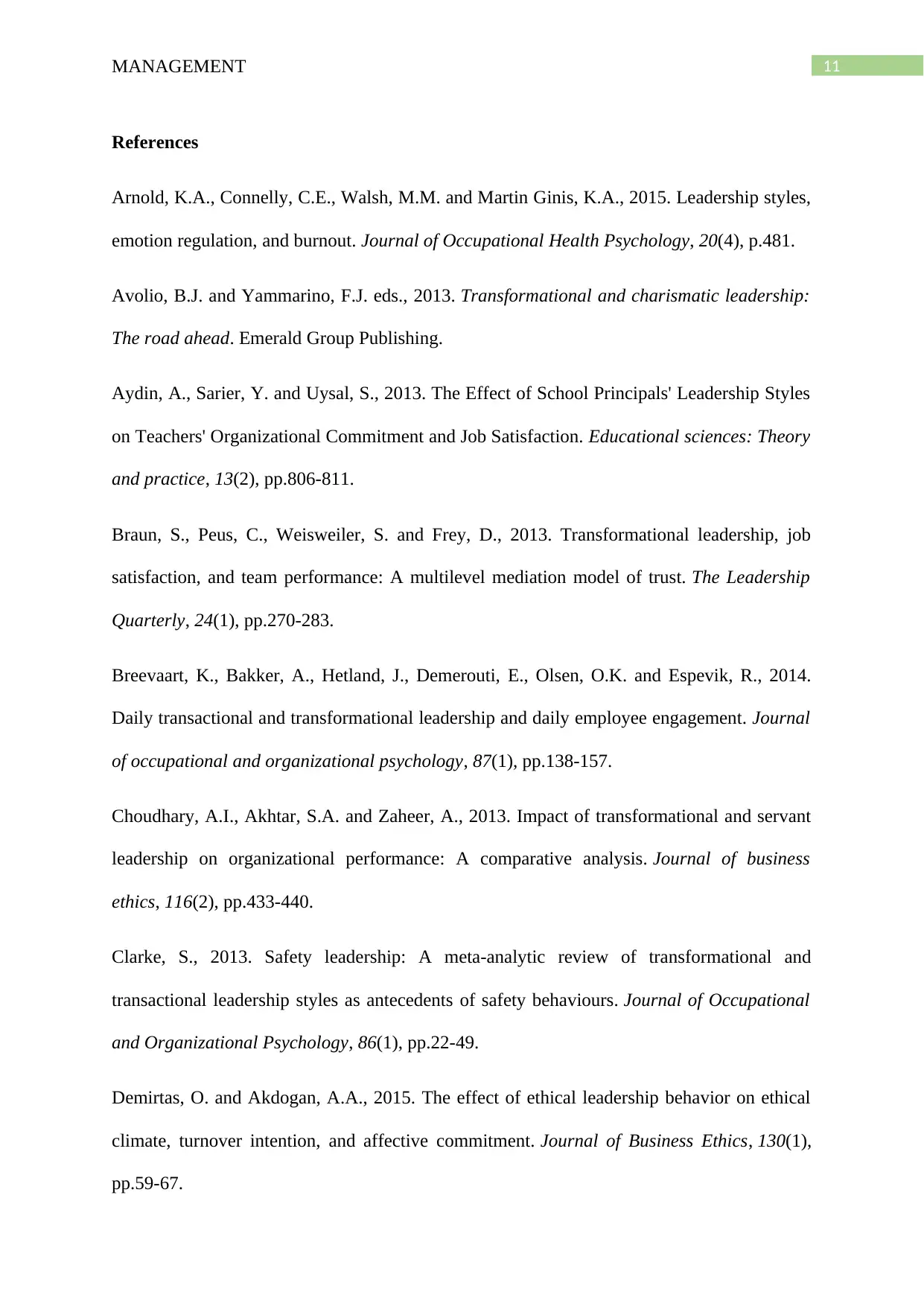
11MANAGEMENT
References
Arnold, K.A., Connelly, C.E., Walsh, M.M. and Martin Ginis, K.A., 2015. Leadership styles,
emotion regulation, and burnout. Journal of Occupational Health Psychology, 20(4), p.481.
Avolio, B.J. and Yammarino, F.J. eds., 2013. Transformational and charismatic leadership:
The road ahead. Emerald Group Publishing.
Aydin, A., Sarier, Y. and Uysal, S., 2013. The Effect of School Principals' Leadership Styles
on Teachers' Organizational Commitment and Job Satisfaction. Educational sciences: Theory
and practice, 13(2), pp.806-811.
Braun, S., Peus, C., Weisweiler, S. and Frey, D., 2013. Transformational leadership, job
satisfaction, and team performance: A multilevel mediation model of trust. The Leadership
Quarterly, 24(1), pp.270-283.
Breevaart, K., Bakker, A., Hetland, J., Demerouti, E., Olsen, O.K. and Espevik, R., 2014.
Daily transactional and transformational leadership and daily employee engagement. Journal
of occupational and organizational psychology, 87(1), pp.138-157.
Choudhary, A.I., Akhtar, S.A. and Zaheer, A., 2013. Impact of transformational and servant
leadership on organizational performance: A comparative analysis. Journal of business
ethics, 116(2), pp.433-440.
Clarke, S., 2013. Safety leadership: A meta‐analytic review of transformational and
transactional leadership styles as antecedents of safety behaviours. Journal of Occupational
and Organizational Psychology, 86(1), pp.22-49.
Demirtas, O. and Akdogan, A.A., 2015. The effect of ethical leadership behavior on ethical
climate, turnover intention, and affective commitment. Journal of Business Ethics, 130(1),
pp.59-67.
References
Arnold, K.A., Connelly, C.E., Walsh, M.M. and Martin Ginis, K.A., 2015. Leadership styles,
emotion regulation, and burnout. Journal of Occupational Health Psychology, 20(4), p.481.
Avolio, B.J. and Yammarino, F.J. eds., 2013. Transformational and charismatic leadership:
The road ahead. Emerald Group Publishing.
Aydin, A., Sarier, Y. and Uysal, S., 2013. The Effect of School Principals' Leadership Styles
on Teachers' Organizational Commitment and Job Satisfaction. Educational sciences: Theory
and practice, 13(2), pp.806-811.
Braun, S., Peus, C., Weisweiler, S. and Frey, D., 2013. Transformational leadership, job
satisfaction, and team performance: A multilevel mediation model of trust. The Leadership
Quarterly, 24(1), pp.270-283.
Breevaart, K., Bakker, A., Hetland, J., Demerouti, E., Olsen, O.K. and Espevik, R., 2014.
Daily transactional and transformational leadership and daily employee engagement. Journal
of occupational and organizational psychology, 87(1), pp.138-157.
Choudhary, A.I., Akhtar, S.A. and Zaheer, A., 2013. Impact of transformational and servant
leadership on organizational performance: A comparative analysis. Journal of business
ethics, 116(2), pp.433-440.
Clarke, S., 2013. Safety leadership: A meta‐analytic review of transformational and
transactional leadership styles as antecedents of safety behaviours. Journal of Occupational
and Organizational Psychology, 86(1), pp.22-49.
Demirtas, O. and Akdogan, A.A., 2015. The effect of ethical leadership behavior on ethical
climate, turnover intention, and affective commitment. Journal of Business Ethics, 130(1),
pp.59-67.
⊘ This is a preview!⊘
Do you want full access?
Subscribe today to unlock all pages.

Trusted by 1+ million students worldwide
1 out of 13
Related Documents
Your All-in-One AI-Powered Toolkit for Academic Success.
+13062052269
info@desklib.com
Available 24*7 on WhatsApp / Email
![[object Object]](/_next/static/media/star-bottom.7253800d.svg)
Unlock your academic potential
Copyright © 2020–2026 A2Z Services. All Rights Reserved. Developed and managed by ZUCOL.




